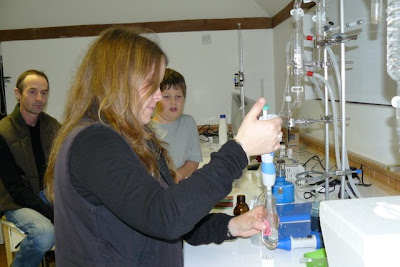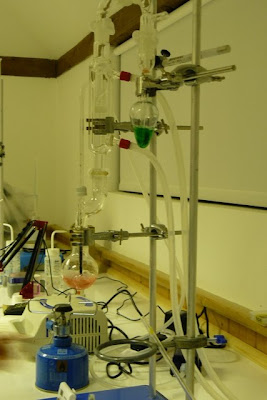We had the pleasure of catching up with some of our old contacts in the UK wine trade last week and spent an afternoon with Emma Rice at her new lab in Sussex. We met Emma while studying viticuluture and oenology together at Plumpton College. She, like me, was one of the few people on the course to have an exisiting wine trade background and the WSET Diploma. Since graduating, we have all taken different paths but Emma decided to set herself up as a consultant oenologist having spent a year in California.
 Emma taking samples to test for malolactic fermentation
Emma taking samples to test for malolactic fermentation
The English wine industry has taken off considerably during the past 20 years having previously been the subject of scorn by many who consider England a joke when it comes to wine. But, the emergence of some really good sparkling wines made by producers such as Nyetimber, Ridgeview, Camel Valley and Breaky Bottom as well as increasingly interesting still wines has made people have a rethink and we have seen a lot of new producers entering the fray as well as investment coming from elsewhere. This is where Emma comes in.

Setting up the equipment to test for Sulphur
Most producers in France manage their vineyards and wineries themselves but they often look for outside assistance when it comes to analysing their wines. This is because winemakers are not always chemists and the equipment required to run standard tests is expensive and requires skill to operate. They may do rudimentary tests to check the levels of sugar during fermentation and use a simple kit to test for sulphur but where real accuracy is involved, an outside lab is routinely used. Samples are dropped off or collected, the tests run and the results delivered back to the producer.
There are few people in England who offer this kind of service and Emma saw an opportunity. She works closely with a number of small producers giving advice during winemaking, collecting and analysing samples for them and being on hand to offer assistance when needed.

Testing for Sulphur by the aspiration method
While we were there she was testing free and bound sulphur levels and checking if malolactic ferments had started.

The sample of wine goes here and air is bubbled through

This is the indicator - if there is Sulphur in the wine it will turn purple and Emma will then use titration to measure the level accuratelyHaving been stronger in the arts and not the sciences at school (a long time ago), I admit to feeling near terror at the thought of having to return to chemistry in 20003. After a few preliminary headaches I became really interested in the subject and surprised myself. I'm sure this is related to the fact that winemaking is all about chemistry and understanding it explains so much. Of course, you don't need to be a chemist to make good wine.
So thanks to Emma for an interesting an informative afternoon - we're looking forward to hearing more good things about the English wine industry with her help.
Emma Rice
Custom Crush
emma.rice@customcrush.co.uk
Tel: 00 44 7530 999 592